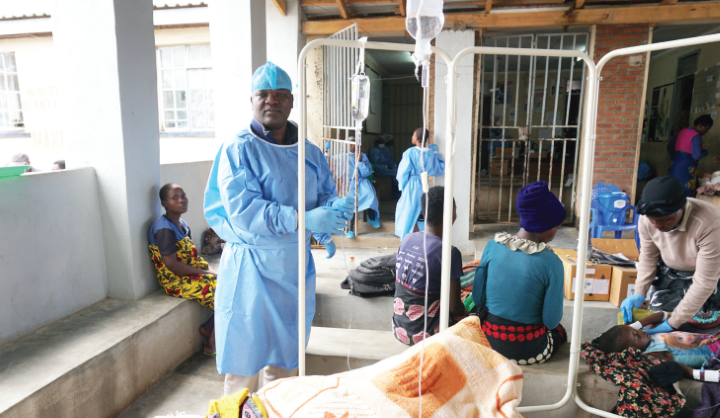Sacrificing comfort to save lives
 It is not unusual to find a health centre with no skilled medical and nursing staff in Malawi’s Shire Valley. Even authorities blame ‘harsh conditions’ for scaring away healthcare workers in Chikhwawa and Nsanje district in southern Malawi.
It is not unusual to find a health centre with no skilled medical and nursing staff in Malawi’s Shire Valley. Even authorities blame ‘harsh conditions’ for scaring away healthcare workers in Chikhwawa and Nsanje district in southern Malawi.
But medical assistant Khwatcha Kabwera-Banda, together with two nurses at Gaga Health Centre in Traditional Authority Chapananga, the remote parts of Chikhwawa, may be among the few that are still standing where some qualified healthcare workers fear to be posted. The father of two acquired his skills at the Malawi College of Health Sciences in Blantyre from 2008 to 2011. He prefers to say it was God’s call.
“Health work is a calling to save lives because nobody else will do it if you don’t. If it is your calling, you can work anywhere you are tasked to go. If it isn’t, it can be difficult to work in the tough conditions typical of rural areas,” he says as 34 patients queue for his services—almost for everything from diagnosis to dispensing drugs.
In the hard-to-reach terrain, the health centre sees about 100 patients daily—meaning day and night—because some clinics have no skilled staff due to lack of proper houses, roads, marketplaces, telecommunication services, water, electricity and entertainment.
The day-by-day workload constitutes 550th of what awaits them: A population of 55 000, half of which is a burden emanating from the clinic’s proximity to Mozambique as well as Chang’ambika and Gaga, which are almost shut down due to lack of nurses and medical officers.
To appreciate what they are doing in the remote ends of underserved T/A Chapananga, health supervisors from Chikhwawa District Hospital Office, where Banda was stationed before transferring to Chithumba, travel over 200km via Blantyre, Mwanza and the neighbouring country because of the broken bridge at Chapananga. Ambulances from Gaga cover about 60km of a more ragged part of the stretch to Mwanza District Hospital.
“I voluntarily applied to relocate to rural areas where the demand for quality health services is high and accessibility of qualified workers is low, but I could not stay at Chithumba because there was no house,” says the medical assistant.
This attitude is a necessary one-off in an understaffed zone where district health officer Elizabeth Nkosi confesses struggling to find a nurse to occupy a house built by Scottish Health Initiative at Chithumba two years since what was meant to be Banda’s home stalled due to disagreements between the contractors and Chikhwawa District Council.
“Public servants naturally shun the Shire Valley due to high temperatures and poor roads. Therefore, it is encouraging that some are still willing and motivated to work in the rural areas. We wish we had more,” says Nkosi, estimating the vacancies of healthcare providers in Chikhwawa at 60 percent.
When it rains, roads to health centres in T/A Mlolo, Nsanje, can be risky, nearly impassable. Damned are travellers on the East Bank Road precariously interspaced by flood-prone bridges and drifts. Also damned are those on Makwasa-Thyolo Road where porridge-like mud makes steep slopes too slippery for cars.
On the tricky terrain, staff shortage is telling in ambulances transporting over one patient in do-or-die situations without a nurse. It is exacerbated by young graduates’ preference for urban life and better paying jobs.
“What keeps the two nurses and I going is the realisation that our job needs dedication and sacrifices to serve the helpless,” says Masenjere Health Centre in-charge, medical assistant Ian Kalonga, 30.
Save for water and electricity woes, he knows that rural workers’ chances of going for further studies are lower than their town-based colleagues even when they decide to sponsor themselves.
But the rural folk do not only save lives, but also money. Kalonga boasts a vast garden which keeps him busy when he is away from his salaried job. By contrast, he says urban dwellers pay big-time for everything from foodstuffs, clothes, housing, entertainment and other basic needs which are almost free in rural areas.
Alinafe Zaina, 26, has been deployed at Sankhulani Health Centre where the border community celebrates nurses-cum-midwives Loveness Msusa and Melenia Mukongwa as selfless saviours.
He says his transfer from Nsanje District Hospital this month was greeted by massive ridicule from parents, friends and relatives, but he is determined to stay long because “he is not different from a majority of Malawians who live in rural areas.”
“After all, the unmet demands for health services in rural areas will give me the experience I need to excel in the profession,” says the medical assistant.
It is amazing what motivates the unsung heroes in the far-flung health facilities, with less than two medical assistants, two nurses and an environmental worker—the skeleton staff recommended by the Ministry of Health.





